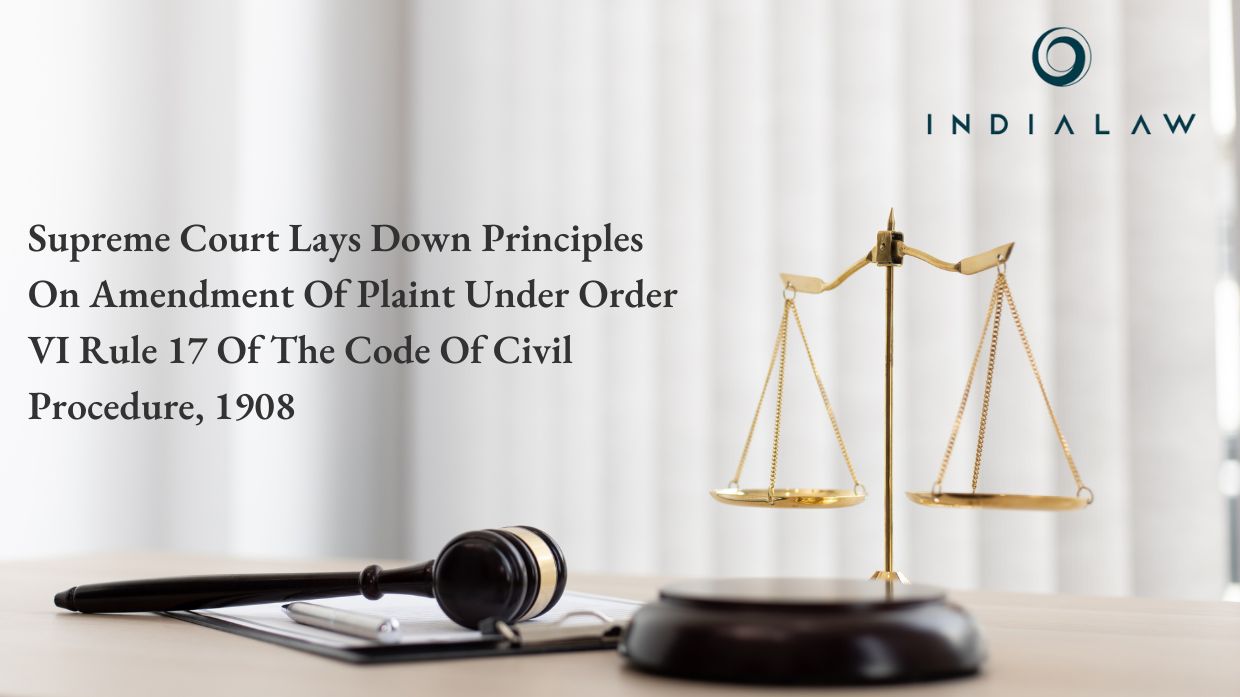Supreme Court Lays Down Principles On Amendment Of Plaint Under Order VI Rule 17 Of The Code Of Civil Procedure, 1908

In a recent judgment[i], the Hon’ble Supreme Court (“SC”) reiterated the principles on amendment of a plaint as prescribed under Order VI Rule 17 of the Code of Civil Procedure, 1908[ii] (“CPC”). A division bench comprising of C.T. Ravikumar and Sanjay Karol, JJ, were presented with a case wherein, objections were raised by the Appellant (“Original Defendant”) to the amendment carried out by the Respondent (“Original Plaintiff”) in the Plaint. The dispute before the SC was, whether the Hon’ble High Court of Madhya Pradesh, Gwalior Bench (“HC”) had erred in permitting the amendment to the plaint filed by the Original Plaintiffs.
In the partition suit, the Original Plaintiff initially did not challenge the validity or the genuineness of the Will in the plaint. However, a year later, through an amendment application, the Original Plaintiff questioned the authenticity of the Will and contended that establishing its genuineness was essential for determining succession based on the Will. Affirming the HC’s decision, the SC stated that without resolving the issue of the Will and its authenticity, partitioning the suit property would be impossible.
Thereafter, the SC relying upon various precedent and the interpretation of the aforesaid provision, held the following observations:
Interpretation of Order VI Rule 17:
The SC, was of the opinion that, the essence of the aforesaid provision is that,
- Amendment of pleading can be allowed at any stage in the legal proceedings;
- The amendment, in question must be necessary to determine the ‘real question of controversy’;
- In an event, such an amendment is carried out by a party, post the commencement of the trail, the Hon’ble Courts must, while granting such leave to amend, ought to come to a conclusion that, such an amendment could not have been carried out prior to that particular point of time, when the same was actually brought.
Precedents Relied Upon:
The SC, relied upon various judgments to consider the law relating to the amendment of pleadings:
- North Eastern Railway Administration, Gorakhpur v. Bhagwan Das[iii] wherein, the SC has held that, while considering matters relating to amendment of pleadings, the Courts should take a liberal approach, however, the same has to be in the four corners of the statutory provisions.
- Life Insurance Corporation of India v. Sanjeev Builders Pvt. Ltd. & Anr.[iv] the SC laid down out principles for amendment of pleadings, which are summarised herein-
- Without prejudice to the other side, all amendment ought to be allowed which are necessary to determine the ‘real question in controversy’. The same is mandatory in nature;
- Without prejudice to the other side, in the event, such an amendment is for effective and proper adjudication of the controversy between the parties to avoid multiple proceedings;
- The amendments which are not permitted are- (a) while seeking amendment, the parties does not seek to withdraw any clear admission made by the party which confers a right on the other side; (b) amendment divesting the other side of certain valuable accrued right; (c) amendments that would alter the nature of the suit; (d) the prayer for amendment is malafide; (e) by the amendment, the other side should not lose a valid defence.
- General Principles for allowing amendment are- (a) a liberal approach must be taken, instead of a hyper-technical approach; (b) Amendment to be allowed when there is an absence of a material particulars in the plaint or introduce an additional or a new approach; (c) However, the cause of action should not be altered by the amendment carried out.
The SC, upon the aforesaid principles and interpretation, observed that in the instant case, the dispute in hand is of a procedural aspect. The SC held that, without dwelling into the authenticity of the Will, which through an amendment application was raised by the Original Plaintiff, the partition of the suit property cannot be possible. Therefore, upholding the HC’s verdict.
The SC’s recent ruling on the amendment of plaint under Order VI Rule 17 of the CPC is a reaffirmation of a liberal approach. By allowing the Original Plaintiff to question the authenticity of the Will, the Court emphasized the necessity of addressing all relevant issues for effective adjudication. Therefore, allowing to raise issues which would assist the Courts to adjudicate the case, in hand, however, without prejudice to the rights of the other side.
[i] Dinesh Goyal @Pappu v. Suman Agarwal (Bindal) & Ors. Arising out of Special Leave Petition (Civil) No.30324/2019.
[ii] Order VI
17. Amendment of pleadings.—The Court may at any stage of the proceedings allow either party to alter or amend his pleadings in such manner and on such terms as may be just, and all such amendments shall be made as may be necessary for the purpose of determining the real questions in controversy between the parties: Provided that no application for amendment shall be allowed after the trial has commenced, unless the Court comes to the conclusion that in spite of due diligence, the party could not have raised the matter before the commencement of trial.
[iii] (2008) 8 SCC 511.
[iv] 2022 SCC OnLine SC 1128.
By entering the email address you agree to our Privacy Policy.



